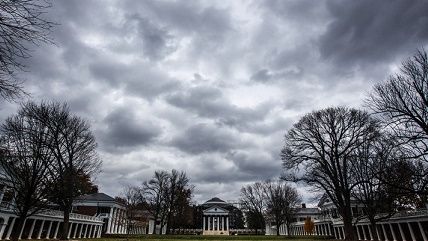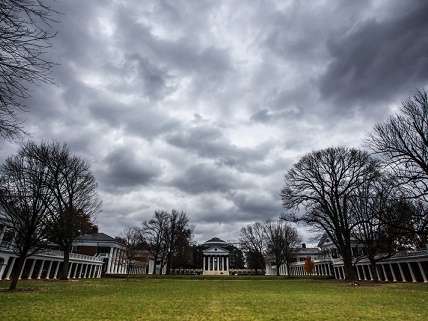One Year After Rolling Stone's UVA Rape Debacle, Fabulists Still Fool the Media
Members of the media were wrong to believe Jackie. They're wrong to believe The Hunting Ground, too.


It has now been a little more than a year since Rolling Stone published Sabrina Rubin Erdely's infamous, false story about a horrific gang rape at the University of Virginia. Rolling Stone is being sued by characters who were misrepresented in the story, Erdely has ceased writing, and the source of all the trouble, UVA student "Jackie," has joined the ranks of Crystal Mangum and Tawana Brawley as a known fabricator of rape accusations.
Jackie's story is routinely cited as one of the most spectacular failures of journalism in the last decade—it's a veritable what-not-to-do-guide for reporters covering sensitive subjects, according to the Columbia University School of Journalism.
But if anti-rape activists, politicians, and media figures are aware of the enormity of Jackie's lies, they show no signs that they have absorbed the right lessons. In fact, the movement to curb sexual assault on college campuses is still beholden to fabulists—fabulists whose lies may be less obvious than Jackie's, but are equally damaging to the ultimate cause of reducing rape on campus while safeguarding students' due process rights.
Exactly one year ago today, I penned an article, "Is the UVA Rape Story a Gigantic Hoax?" It was my third attempt to grapple with Rolling Stone's then-recently published expose on a culture of indifference toward rape at UVA; my first two articles had presumed the central accusation—a woman named Jackie had been gang raped by seven members of the Phi Psi fraternity during a fall 2012 party—was true, and focused on ways to reduce campus violence. My third article expressed misgivings about the veracity of Jackie's claims, citing Worth editor Richard Bradley, another early skeptic. This article was initially criticized for bluntly questioning a self-described survivor of sexual assault, but was almost immediately vindicated as Jackie's credibility collapsed over the next several days. (I eventually won a 2014 Southern California Journalism Award for my commentary on the subject.)
It's difficult to overstate the extent to which Rolling Stone's preferred narrative about campus rape took precedence over the actual facts. Erdely's expose was intended as an exploration of the kinds of violence and institutional failures college-aged women are forced to deal with incessantly, but the author found a wholly unrepresentative story—Jackie's—and made it the centerpiece of the article.
Indeed, one of the first details in Jackie's recounting of her ordeal is the thing that instantly struck me as false: Jackie claimed that she had not been drinking at the time of the attack. According to the version of events she recounted to Erdely, Jackie dumped her drink before letting her date—a lifeguard named Haven Monahan—lure her to an upstairs bedroom at the Phi Psi house, where half a dozen brothers waited to rape her. Most college sexual assault disputes take place against a backdrop of incapacitation-inducing alcohol and/or drug abuse; fully lucid victims are an incredible rarity. Equally astonishing was the notion that Phi Psi's vicious assault was elaborately premeditated, ritualistic in nature, and involved numerous co-conspirators—young sociopaths who would perpetrate such horrific crimes over and over again, until they were caught.
We now know, of course, that Jackie's story as depicted in the pages of Rolling Stone is a lie. There was no party on the night in question. Haven Monahan does not exist. Jackie created him out of thin air presumably to trick her friends into thinking she had a boyfriend, and went to elaborate lengths to maintain the deception. As Cathy Young wrote in Reason:
It's not simply that there was no party at Phi Kappa Psi, the fraternity named by Jackie, anywhere near the time when she said she was attacked. It's not simply that her account changed from forced oral sex to vaginal rape and from five assailants to seven, or that her friends saw no sign of her injuries after the alleged assault. What clinches the case is the overwhelming proof that "Drew," Jackie's date who supposedly orchestrated her rape, was Jackie's own invention.
Is it possible that someone sexually assaulted Jackie on the night when she claimed to be going out with her fictional suitor? Theoretically, yes. But it's also clear that her credibility is as non-existent as "Haven Monahan."
But the problem is not merely that Jackie lied. By allowing herself to be duped, Erdely gave readers the false impression that Jackie's rape was emblematic of the situation faced by young women on college campuses. But the vast majority of campus sexual assaults do not involve villains as obvious and psychopathically depraved as Jackie's rapists.
That's why it has been so disheartening to see activists and media fully embrace The Hunting Ground, a purported documentary on campus sexual assault that embraces many of the core tenets of Erdely's erroneous reporting. For one thing, filmmakers significantly distorted the cases of accused rapists Brandon Winston and Jameis Winston, whose alleged victims provide much of the film's substance. For another, the movie commits to the idea that most campus rapists are, like the monsters in Jackie's story, serial predators. But the integrity of the science behind the serial predator theory has been fundamentally misrepresented by its most important devotee, Dr. David Lisak, according to a detailed investigation conducted by Reason contributor Linda LeFauve.
Indeed, both Winstons are implied to be serial predators who drug their victims—even though no evidence that the accusers were actually drugged has ever surfaced. It's not even totally clear, upon careful review of the facts, that the two men are guilty of anything other than ill-advised, drunken sex.
Are campuses home to some serial predators? Certainly. But they are also home to a great many young men and women who don't practice good consent norms, drink recklessly, and have sex under confusing circumstances. There are a great many victims of sexual assault on college campuses (though not as many as is commonly believed), and yet activists and government policymakers keep giving a platform to the serial exaggerators and outright liars.
A movement that wants to promote safe, consensual sex on college campuses simply must do a better job weeding out fabulists if it hopes to inspire support for its cause. Unfortunately, the activists' call to "believe all victims"—a sentiment recently echoed by Hillary Clinton of all people—is clearly getting in the way.
Those who believed Jackie were wrong to do so, and a year later, they are still fooling themselves.
(I reached out to Erdely through a mutual contact. She declined to be interviewed for this article.)


Show Comments (146)